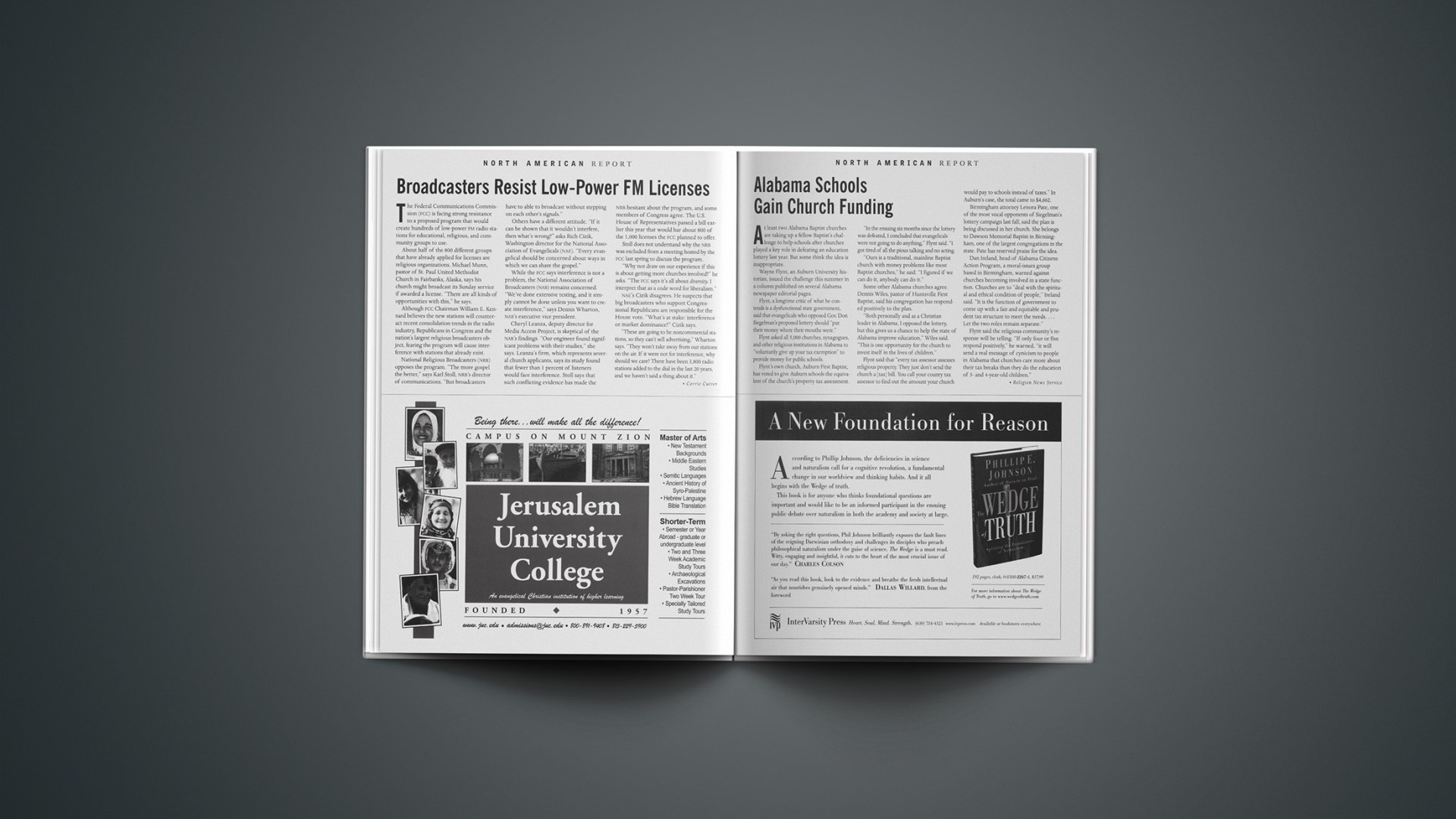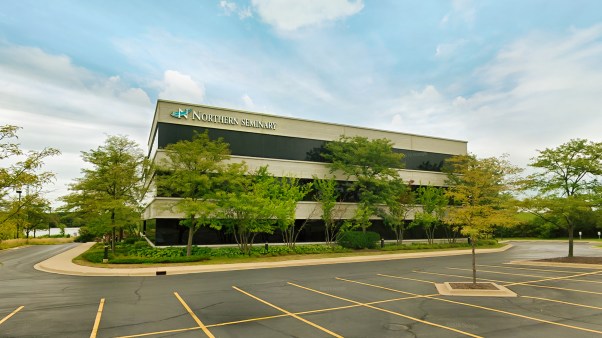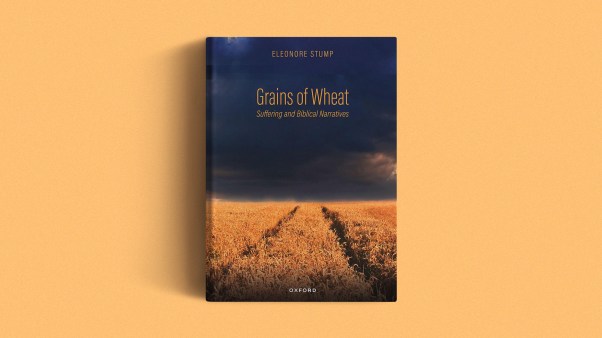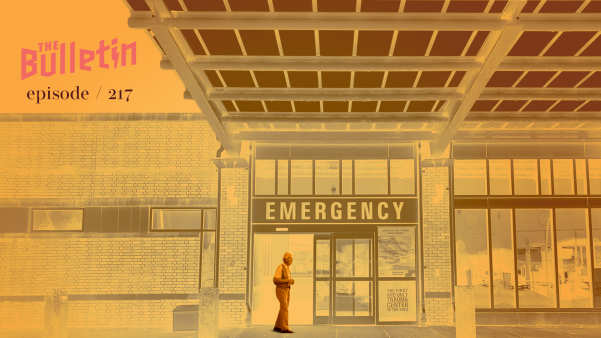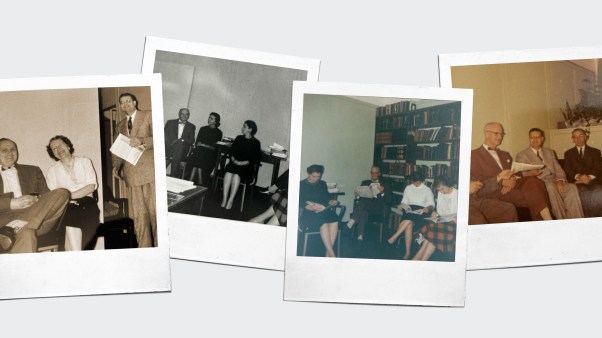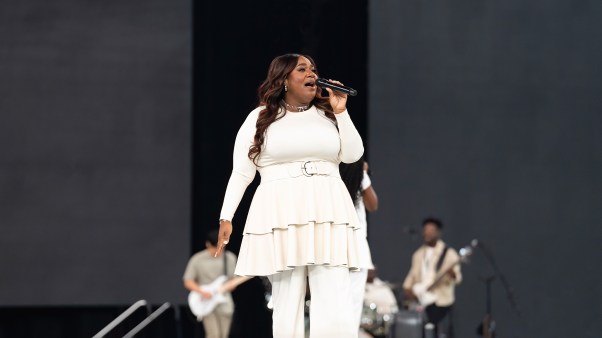The Federal Communications Commission (FCC) is facing strong resistance to a proposed program that would create hundreds of low-power FM radio stations for educational, religious, and community groups to use.About half of the 800 different groups that have already applied for licenses are religious organizations. Michael Munn, pastor of St. Paul United Methodist Church in Fairbanks, Alaska, says his church might broadcast its Sunday service if awarded a license. “There’s all kinds of opportunities with this,” he says.Although FCC Chairman William E. Kennard believes the new stations will counteract recent consolidation trends in the radio industry, Republicans in Congress and the nation’s largest religious broadcasters object, fearing the program will cause interference with stations that already exist.National Religious Broadcasters (NRB) opposes the program. “The more gospel the better,” says Karl Stoll, NRB’s director of communications. “But broadcasters have to able to broadcast without stepping on each other’s signals.”Others have a different attitude. “If it can be shown that it wouldn’t interfere, then what’s wrong?” asks Rich Cizik, Washington director for the National Association of Evangelicals (NAE). “Every evangelical should be concerned about ways in which we can share the gospel.”While the FCC says interference is not a problem, the National Association of Broadcasters (NAB) remains concerned. “We’ve done extensive testing and it simply cannot be done unless you want to create interference,” says Dennis Wharton, NAB’s executive vice president.Cheryl Leanza, deputy director for Media Access Project, is skeptical of the NAB’s findings. “Our engineer found significant problems with their studies,” she says. Leanza’s firm, which represents several church applicants, says its study found that fewer than 1 percent of listeners would face interference.Stoll says that such conflicting evidence has made the NRB hesitant about the program, and some members of Congress agree. The U.S. House of Representatives passed a bill earlier this year that would bar about 800 of the 1,000 licenses the FCC planned to offer. And despite accounts that portrayed conservative religious groups at odds with Republicans in Congress, Stoll believes many Christian conservatives support the legislation.Stoll does not understand why the NRB was excluded from a meeting hosted by the FCC last spring to discuss the program. “Why not draw on our experience if this is about getting more churches involved?” he asks. “The FCC says it’s all about diversity. I interpret that as a code word for liberalism.”NAE’s Cizik disagrees. He suspects that big broadcasters who support Congressional Republicans are responsible for the House vote. “What’s at stake: interference or market dominance?” Cizik says.NAB has made campaign contributions to several of the key opponents of low-power FM during the last two years, but Wharton says NAB’s dissatisfaction has nothing to do with politics.”These are going to be noncommercial stations, so they can’t sell advertising,” he says. “They won’t take away from our stations on the air. If it were not for interference, why should we care? There’s been 3,800 radio stations added to the dial in the last 20 years, and we haven’t said a thing about it.”
Related Elsewhere
:The FCC ‘s site on LPFM includes a fact sheet, a Frequently Asked Questions (FAQ) page, and the entire text of the commission’s report and order.The NRB’s statement against LPFM is online, though you’ll have to scroll past many other press releases to find it.The full text of the FM Radio Act of 2000 is available at the National Association of Broadcasters site.Other recent Christianity Today stories on radio include:Longest-Running Radio Show On Earth | At 50, Unshackled! still transforms broken lives. (Aug. 3, 2000) The Windup Gospel | Christian broadcasting in Africa is amplified by new technology, innovative partnerships. (March 16, 2000) Smaller Is Better? | Feds OK low-power radio licenses, but broadcasters decry interference. (March 14, 2000) Hispanic Christian Radio Grows by Blocks and Blends | New information-age strategy enables stations to compete with secular counterparts. (May 18, 1998)
Copyright © 2000 Christianity Today. Click for reprint information.

